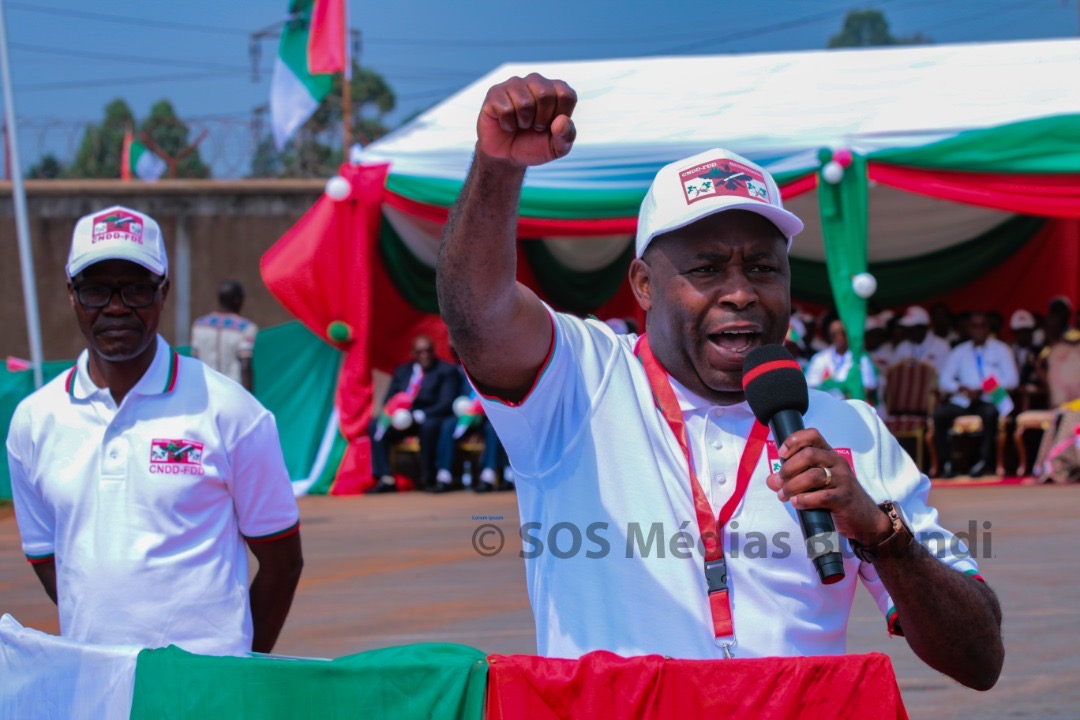Burundi : Ndayishimiye defends the CNDD-FDD victory and calls for a formal denunciation of electoral fraud

SOS Médias Burundi
Gitega, June 16, 2025 – As the results of the June 5 district and legislative elections are hotly contested, President Évariste Ndayishimiye is taking a stand. From Gitega, he defends the CNDD-FDD victory and calls on opposition parties to formally denounce the alleged fraud, while promising sanctions against those responsible. But his stance as a referee is divisive.
Faced with the contested results of the June 5 district and legislative elections, President Évariste Ndayishimiye spoke on Saturday from the presidential palace in Gitega – the political capital. He urged political parties to rigorously document the irregularities they denounce and defended the legitimacy of the landslide victory of his party, the CNDD-FDD.
« I am shocked that some political leaders prefer to wait for cameras and microphones to speak about fraud, instead of acting immediately when the facts occur, » declared the Head of State. He called on political parties to submit, district by district and polling station by polling station, all evidence of fraud so that justice can be served, including by the Constitutional Court.
A controversial position of referee and actor
While he actively campaigned alongside the CNDD-FDD candidates, the President now presents himself as a mediator. He promises « strong decisions » if cases of massive fraud are proven and does not rule out a repeat of the election in certain constituencies. He warns : « Members of the CENI (Independent National Electoral Commission) implicated in irregularities will be punished. »
This statement has prompted a reaction from legal experts. In reality, the President of the Republic has neither the legal authority to punish members of the CENI nor to correct irregularities observed during an election. These prerogatives fall exclusively within the purview of the Constitutional Court, several analysts believe.
« By officially opening the elections, when he does not have the constitutional mandate to do so, and by repeatedly speaking out about the conduct of the election, Évariste Ndayishimiye is substituting himself for the competent institutions. It’s insane, » denounced a Burundian journalist. He added : « This isn’t even a presidential election where he could speak as a candidate. »
A claim of legitimacy, despite challenges
The President rejected suspicions of authoritarianism, asserting that the CNDD-FDD’s landslide victory does not signal the advent of a one-party regime.
« Even before these elections, our party already had a parliamentary majority. What matters is good governance, transparency, and respect for human rights, » he declared.
Regarding the concerns of the civil society and certain international partners, he was firm : « We cannot go against the will of the people. The people voted overwhelmingly for the CNDD-FDD. »
Specific, but belated accusations
Among the protesters were UPRONA, the CDP, the Burundi Bwa Bose coalition, an independent candidate, and the Catholic Church, which had deployed observers to more than 2,400 polling stations. The allegations included cases of ballot stuffing, multiple voting without a proxy, unauthorized persons in polling stations, and voting before the legal opening time.
The president expressed surprise that these irregularities were not immediately reported. « Why not react immediately? » he asked.
But for some, the very fact that the president feels compelled to react so vigorously is a sign that the Catholic bishops’ statement, highly critical of the election process, has had an impact.
Electoral justice or smokescreen?
« Burundi still has honest men capable of ensuring justice prevails, » assured Ndayishimiye, calling on the plaintiffs to submit their applications within the deadline.
In the tense post-election context, the president’s words are therefore struggling to convince all stakeholders, especially since the CNDD-FDD’s concentration of power is causing concern beyond Burundi’s borders. The CNDD-FDD, the former Hutu rebel group that became the ruling party in 2005 thanks to the August 2000 Arusha Peace Agreement, which ended a decade of civil war that left more than 300,000 dead according to the UN, has won 100% of the seats in the National Assembly, the CENI announced, a first in the small east African nation. The CENI describes the election as transparent, while the opposition claims rigging.

